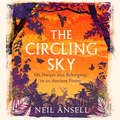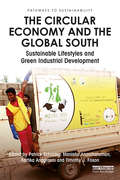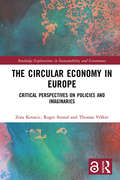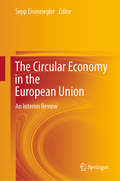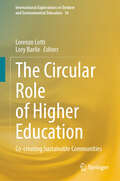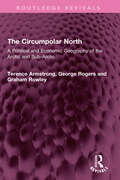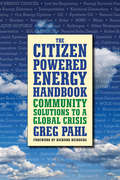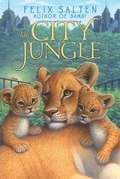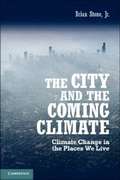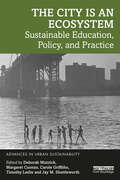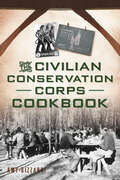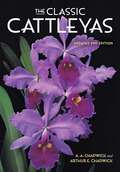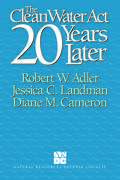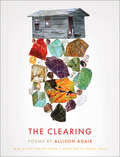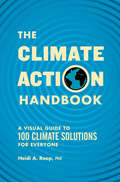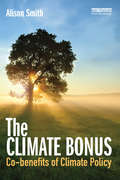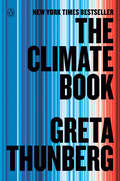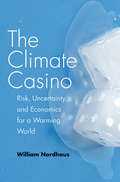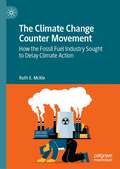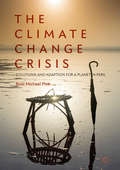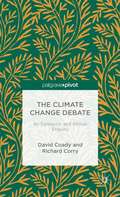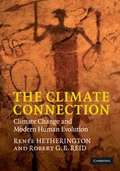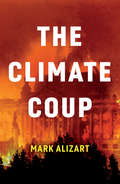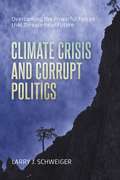- Table View
- List View
The Circling Sky: On Nature and Belonging in an Ancient Forest
by Neil AnsellFrom a 2018 Wainwright Prize shortlisted author, THE CIRCLING SKY is part childhood memoir, blended with exquisite nature observation, and the story of one man's journey over a year to one of the UK's key natural habitats, the New Forest of HampshireIn the form of several journeys, beginning in January 2019, Neil Ansell returns for solitary walks to the New Forest in Hampshire, close to where he was born. With beautiful sightings and observations of birds, trees, butterflies, insects and landscape, this is also a reflective memoir on childhood, on the history of one of the most ancient and important natural habitats in the United Kingdom, and on the Gypsies who lived there for centuries - and were subsequently expelled to neighbouring cities. It is also part polemic on our collective and individual responsibility for the land and world in which we live, and how we care for it.As Neil Ansell concludes so eloquently, 'Evolution has no choice in what it does, but we do, as a species, if not always as individuals'.(P)2021 Headline Publishing Group Limited
The Circular Economy and the Global South: Sustainable Lifestyles and Green Industrial Development (Pathways to Sustainability)
by Patrick Schröder Manisha Anantharaman Kartika Anggraeni Timothy FoxonThe circular economy is a policy approach and business strategy that aims to improve resource productivity, promote sustainable consumption and production and reduce environmental impacts. This book examines the relevance of the circular economy in the context of developing countries, something which to date is little understood. This volume highlights examples of circular economy practices in developing country contexts in relation to small and medium enterprises (SMEs), informal sector recycling and national policy approaches. It examines a broad range of case studies, including Argentina, Brazil, China, Colombia, India, Indonesia, Kenya, South Africa, and Thailand, and illustrates how the circular economy can be used as a new lens and possible solution to cross-cutting development issues of pollution and waste, employment, health, urbanisation and green industrialisation. In addition to more technical and policy oriented contributions, the book also critically discusses existing narratives and pathways of the circular economy in the global North and South, and how these differ or possibly even conflict with each other. Finally, the book critically examines under what conditions the circular economy will be able to reduce global inequalities and promote human development in the context of the Sustainable Development Goals. Presenting a unique social sciences perspective on the circular economy discourse, this book is relevant to students and scholars studying sustainability in economics, business studies, environmental politics and development studies.
The Circular Economy in Europe: Critical Perspectives on Policies and Imaginaries (Routledge Explorations in Sustainability and Governance)
by Zora Kovacic Roger Strand Thomas VölkerThe Circular Economy in Europe presents an overview and a critical discussion on how circularity is conceived, imagined, and enacted in current EU policy-making. In 2013, the idea of a circular economy entered the stage of European policy-making in the efforts to reconcile environmental and economic policy objectives. In 2019 the European Commission declared in a press release that the Circular Economy Action Plan has been delivered. The level of circularity in the European economy, however, has remained the same. Bringing together perspectives from social sciences, environmental economics and policy analysis, The Circular Economy in Europe provides a critical analysis of policies and promises of the next panacea for growth and sustainability. The authors provide a theoretical and empirical basis to discuss how contemporary societies conceive their need to re-organise production and consumption and explores the messy assemblage of institutions, actors, waste streams, biophysical flows, policy objectives, scientific disciplines, values, expectations, promises and aspirations involved. This book is essential reading for all those interested in understanding how ideas about the circular economy emerged historically, how they gained traction and are used in policy processes, and what the practical challenges in implementing this policy are.
The Circular Economy in the European Union: An Interim Review
by Sepp EisenrieglerThe implementation of the circular economy will entail a major transformation from a resource-destroying, linear economy to a circular one that operates within the planet’s regenerative boundaries. This book presents an interim assessment of the implementation of a circular economy in the EU. It reveals what achievements have been made in various EU institutions, but which are scarcely perceived by the public; which basic scientific principles can be applied in this context; and what NGOs are demanding beyond this progress. It provides convincing arguments for abandoning the “hamster wheel” of material-based satisfaction of our needs, and shows that the primacy of the economy stands in the way of a good life for all. Given its focus, it will appeal to everyone interested in an ecologically sustainable economic system.
The Circular Role of Higher Education: Co-creating Sustainable Communities (International Explorations in Outdoor and Environmental Education #2)
by Lorenzo Lotti Lory BarileThis edited volume presents a series of case studies and research evidence on how global students contribute to widening the debate on sustainability within Higher Education institutions: by offering their own stories, along with academics and external stakeholders they create a unique context where their diverse backgrounds are combined into a wider learning experience. This environment enables them to return to their communities and provide leadership and support in tackling real life sustainability related issues they may face. This book describes this circular and virtuous process, which we refer to as Circular Education. Through this process, Higher Education institutions are enriching environments and supporting communities and their cultural hubs. Readers will discover how students can add to and learn from this critical dialogue with peers, academics, and external stakeholders.It is of interest for students, policymakers, academics and any other institution and organization interested in promoting sustainability in Higher Education.
The Circumpolar North: A Political and Economic Geography of the Arctic and Sub-Arctic (Routledge Revivals)
by George Rogers Graham Rowley Terence ArmstrongFirst Published in 1978, The Circumpolar North is designed for anyone with a more than superficial interest in the northern regions of our planet, geographical, economic, social, or political. The primary importance of North today is as a source of raw materials, as a world crossroads, and as a touchstone of the way nations behave towards their minority groups. Strategic considerations have led to the expenditure of vast sums of money; but world population expansion has not yet affected the northlands and their preservation in a natural state is still a feasible objective. The authors are experts in their own areas and have provided regional chapters on each of the land and ocean areas. The book compares the different approaches of the countries involved and deals also, in the context of the northern seas, with another political dimension – the relations between nations and their success in achieving international management of resources. This is an interesting read for scholars of geography, international relations and international economics.
The Citizen-Powered Energy Handbook
by Greg PahlIn the wake of Hurricane Katrina, Al Gore's summer blockbuster "An Inconvenient Truth," and crude oil prices soaring to all-time highs, more people than ever know the truth about our oil addiction. Global warming is here. M. King Hubbert's oil peak is fast approaching (or may already have arrived). The secret's out: fossil fuel reserves are dwindling and popular interest has created the need for accessible, realistic solutions. The Citizen-Powered Energy Handbook, a clear-eyed view of the critical situation we face, offers ways out. Greg Pahl examines energy technologies currently available and homes in on renewable energy strategies that can be adopted by individuals and communities. Such cooperative initiatives have been common in Europe for years and are beginning to gain a foothold in the US. Each chapter focuses on a different renewable energy category-solar, wind, water, biomass, liquid biofuels, and geothermalathen reviews their advantages and disadvantages and describes numerous examples of successful, proven local initiatives. The Citizen-Powered Energy Handbook is an eloquent appeal for community and regional action to initiate an array of solutions to energy needs until now controlled by large, distant utilities and consortiums. It is time to take back control of the energy and environmental challenges ahead; this book will help people do just that. It is a handbook for anyone ready to take the first steps towards a more sustainable future.
The City Jungle
by Felix Salten Whittaker ChambersGet to know the lives and longings of animals in a city zoo in this time-honored tale from the author of Bambi.The animals of the city zoo miss their homes. While they appreciate the company of one another, they have a fierce longing to be free of the daily visitors, the city sounds--and most of all, the bars to their cages. Vasta the mouse is the only animal who is not behind bars. She uses her freedom to travel from cage to cage, visiting Yppa the orangutan and her young son Tikki, Hella the proud lioness and her two cubs, Mino the crazy fox, Pardinos the friendly elephant, and Hallo the tame wolf. The zookeepers and visitors have no idea what life is really like in this city jungle, but Felix Salten's depiction of these animals' stories is brought vividly to life in this beautiful repackage.
The City and the Coming Climate: Climate Change and the Places We Live
by Brian Stone Jr.This book is the first to explore the dramatic amplification of global warming underway in cities and the range of actions that individuals and governments can undertake to slow the pace of warming. A core thesis of the book is that the principal strategy currently advocated to mitigate climate change - the reduction of greenhouse gases - will not prove sufficient to measurably slow the rapid pace of warming in urban environments. Brian Stone explains the science of climate change in terms accessible to the nonscientist and with compelling anecdotes drawn from history and current events. The book is an ideal introduction to climate change and cities for students, policy makers, and anyone who wishes to gain insight into an issue critical to the future of our cities and the people who live in them.
The City is an Ecosystem: Sustainable Education, Policy, and Practice (Advances in Urban Sustainability)
by Margaret Cuonzo Deborah Mutnick Carole Griffiths Timothy Leslie Jay M. ShuttleworthThe City is an Ecosystem maps an interdisciplinary, community-engaged response to the great ecological crises of our time—climate change, biodiversity loss, and social inequality—which pose particular challenges for cities, where more than half the world’s population currently live. Across more than twenty chapters, the three parts of the book cover historical and scientific perspectives on the city as an ecosystem; human rights to the city in relation to urban sustainability; and the city as a sustainability classroom at all educational levels inside and outside formal classroom spaces. It argues that such efforts must be interdisciplinary and widespread to ensure an informed public and educated new generation are equipped to face an uncertain future, particularly relevant in the post-COVID-19 world. Gathering multiple interdisciplinary and community-engaged perspectives on these environmental crises, with contemporary and historical case study discussions, this timely volume cuts across the humanities and social and health sciences, and will be of interest to policymakers, urban ecologists, activists, built environment professionals, educators, and advanced students concerned with the future of our cities.
The Civilian Conservation Corps Cookbook
by Amy BizzarriThe Civilian Conservation Corps was a voluntary government work relief program that offered nearly 3 million unemployed, unmarried men the job of restoring and conserving America's public lands, forests and parks. The wages weren't the only draw--the program also threw in three square meals a day served in the camp mess hall. The Civilian Conservation Corps Cookbook features the recipes that sustained not only the CCC during the Great Depression but also our grandparents and great-grandparents. Budget friendly, with ingredients that can easily be found--if not in your very own pantry then at your local grocer--these recipes reflect the "make do" attitude of Depression-era home cooks.
The Classic Cattleyas
by A. A. Chadwick Arthur E. ChadwickIn 1818, William Cattley succeeded in flowering one of the first species of the genus that would bear his name. These first cattleyas are the classic cattleyas, whose form defined the essence of tropical orchids for generations to come. Indeed, the color of their flowers became known as "orchid." In this helpful and informative book, each classic Cattleya species is described in fascinating detail, and its role in breeding programs is elucidated. All that is required to appreciate and grow the large-flowered cattleyas successfully is included. Cultivation, humidity and watering, fertilizing, propagation, and diagnosing and treating problems are detailed, making this volume valuable for both veteran orchid enthusiasts and those who simply love these beautiful flowers.
The Clean Water Act 20 Years Later
by Robert W. Adler Diane M. Cameron Jessica C. LandmanThis volume explores the issues associated with the complex subject of water quality protection in an assessment of the successes and failures of the Clean Water Act over the past twenty years. In addition to examining traditional indicators of water quality, the authors consider how health concerns of the public have been addressed, and present a detailed examination of the ecological health of our waters. Taken together, these measures present a far more complete and balanced picture than raw water quality data alone.As well as reviewing past effectiveness, the book includes specific recommendations for the reauthorization of the Act, which is to be considered by Congress in 1995. This balanced and insightful account will surely shape the debate among legislative and policy experts and citizen activists at all levels who are concerned with issues of water quality.
The Clearing: Poems (Max Ritvo Poetry Prize Ser.)
by Allison AdairA poetry debut that&’s &“a lush, lyrical book about a world where women are meant to carry things to safety and men leave decisively&” (Henri Cole). Luminous and electric from the first line to the last, Allison Adair&’s debut collection navigates the ever-shifting poles of violence and vulnerability with a singular incisiveness and a rich imagination. The women in these poems live in places that have been excavated for gold and precious ores, and they understand the nature of being hollowed out. From the midst of the Civil War to our current era, Adair charts fairy tales that are painfully familiar, never forgetting that violence is often accompanied by tenderness. Here we wonder, &“What if this time instead of crumbs the girl drops / teeth, her own, what else does she have&”?The Clearing knows the dirt beneath our nails, both alone and as a country, and pries it gently loose until we remember something of who we are, &“from before . . . from a similar injury or kiss.&” There is a dark beauty in this work, and Adair is a skilled stenographer of the silences around which we orbit. Described by Henri Cole as &“haunting and dirt caked,&” her unromantic poems of girlhood, nature, and family linger with an uncommon, unsettling resonance.Winner of the 2019 Max Ritvo Poetry PrizePraise for The Clearing &“A dark and bodily nod to folk- and fairy-tale energy.&” —Boston Globe &“The poems in Adair&’s debut draw on folklore and the animal world to assert feminist viewpoints and mortal terror in lush musical lines, as when &“A fat speckled spider sharpens / in the shoe of someone you need.&” —New York Times Book Review, &“New & Noteworthy Poetry&” &“Like Grimms&’ fairy tales, Adair&’s poems are dark without being bleak, hopeless, or disturbing. Readers will find the collections lush language and provocative imagery powerfully resonant.&” —Publishers Weekly (Starred Review)
The Climate Action Handbook: A Visual Guide to 100 Climate Solutions for Everyone
by Heidi RoopThis must-have book shows us WHY we need to take action now to combat climate change and then, critically, HOW, through easy-to-understand language and fascinating infographics that offer each of us varied and doable solutions to the overwhelming challenges facing our planet. As more focus is put on climate science, there is a need for each of us to learn how we can change our habits in our home, communities, and government to save our planet. Enter The Climate Action Handbook. A visually stunning guide, it does what no other climate change book manages to do: it's approachable, digestible, and offers the average person ideas, options, and a roadmap for action. It also offers hope—often overlooked in climate change conversations. Climate actions can create near-instantaneous improvements in air quality and can offer ways to address societal inequities, green our communities, save money, and build local economies. Stunning and creative infographics help anyone easily grasp the many challenges facing our planet, as well as how every action—be it on the individual, local, or government level—matters. From food and fashion choices, rethinking travel, greening up our homes and gardens, to civic engagement and championing community climate planning, Dr. Heidi Roop shares 100 wide-ranging ways that readers from all walks of life can help move the needle in the right direction. Actions include: • Cutting down on food waste • Reducing your driving speed • Voting in every election • Using the cold-water cycle on your washing machine • Supporting healthy soils in your gardens and community green spaces • Engaging in local climate action planning • Preparing an emergency kit for your home • Deleting unused emails and online accounts • Swapping out milk for nondairy alternatives like oat milk • Opting for slower shipping whenever possible • Regularly maintaining and clean your heating and cooling systems • Engaging in climate conversations at work and at home And many more!Return to this invaluable resource again and again to discover a roadmap for action and much-needed hope. What will your climate journey look like?
The Climate Bonus: Co-benefits of Climate Policy
by Alison SmithWe urgently need to transform to a low carbon society, yet our progress is painfully slow, in part because there is widespread public concern that this will require sacrifice and high costs. But this need not be the case. Many carbon reduction policies provide a range of additional benefits, from reduced air pollution and increased energy security to financial savings and healthier lifestyles, that can offset the costs of climate action. This book maps out the links between low carbon policies and their co-benefits, and shows how low carbon policies can lead to cleaner air and water, conservation of forests, more sustainable agriculture, less waste, safer and more secure energy, cost savings for households and businesses and a stronger and more stable economy. The book discusses the ways in which joined-up policies can help to maximise the synergies and minimise the conflicts between climate policy and other aspects of sustainability. Through rigorous analysis of the facts, the author presents well-reasoned and evidenced recommendations for policy-makers and all those with an interest in making a healthier and happier society. This book shows us how, instead of being paralysed by the threat of climate change, we can use it as a stimulus to escape from our dependence on polluting fossil fuels, and make the transition to a cleaner, safer and more sustainable future.
The Climate Book: The Facts and the Solutions
by Greta ThunbergA NEW YORK TIMES BESTSELLERWe still have time to change the world. From climate activist Greta Thunberg, comes the essential handbook for making it happen.You might think it's an impossible task: secure a safe future for life on Earth, at a scale and speed never seen, against all the odds. There is hope—but only if we listen to the science before it's too late.In The Climate Book, Greta Thunberg has gathered the wisdom of over one hundred experts—geophysicists, oceanographers and meteorologists; engineers, economists and mathematicians; historians, philosophers and Indigenous leaders—to equip us all with the knowledge we need to combat climate disaster. Throughout, illuminating and often shocking grayscale charts, graphs, diagrams, photographs, and illustrations underscore their research and their arguments. Alongside them, she shares her own stories of demonstrating and uncovering greenwashing around the world, revealing how much we have been kept in the dark. This is one of our biggest challenges, she shows, but also our greatest source of hope. Once we are given the full picture, how can we not act? And if a schoolchild's strike could ignite a global protest, what could we do collectively if we tried?We are alive at the most decisive time in the history of humanity. Together, we can do the seemingly impossible. But it has to be us, and it has to be now.
The Climate Casino
by William D. NordhausClimate change is profoundly altering our world in ways that pose major risks to human societies and natural systems. We have entered the Climate Casino and are rolling the global-warming dice, warns economist William Nordhaus. But there is still time to turn around and walk back out of the casino, and in this essential book the author explains how. Bringing together all the important issues surrounding the climate debate, Nordhaus describes the science, economics, and politics involved--and the steps necessary to reduce the perils of global warming. Using language accessible to any concerned citizen and taking care to present different points of view fairly, he discusses the problem from start to finish: from the beginning, where warming originates in our personal energy use, to the end, where societies employ regulations or taxes or subsidies to slow the emissions of gases responsible for climate change. Nordhaus offers a new analysis of why earlier policies, such as the Kyoto Protocol, failed to slow carbon dioxide emissions, how new approaches can succeed, and which policy tools will most effectively reduce emissions. In short, he clarifies a defining problem of our times and lays out the next critical steps for slowing the trajectory of global warming.
The Climate Change Counter Movement: How the Fossil Fuel Industry Sought to Delay Climate Action
by Ruth E. McKieThis book provides an historical account of the emergence and spread of the climate change counter movement across the globe. Drawing on an extensive database developed by the author, the book recounts the development of an international network, taking the reader on a journey through the history of the movement before looking closely at a series of comparative case studies examining movement organisations in different countries.
The Climate Change Crisis: Solutions And Adaption For A Planet In Peril
by Ross Michael PinkThis book explores how the world community will respond to the unfolding humanitarian crisis caused by climate change. It recognises climate change as the greatest threat to human development in the 21st century, bringing with it: flooding, drought, extreme temperatures, health crises, threats to human security and severe harm to economic development.The Climate Change Crisis addresses climate change and its impact as a major threat for countries around the world. Through a collection of interviews with leading environmentalists and exploration into new innovations that can offer hope and protection for billions of people, this book presents an interdisciplinary approach towards understanding the paramount health and development challenges of climate change.This timely and informative book cuts across several disciplines, including human rights, public policy, international relations, national refugee policy, and migration studies.
The Climate Change Debate: An Epistemic and Ethical Enquiry
by David Coady Richard CorryOf the two kinds of philosophical questions - epistemic and ethical - raised by the public debate about climate change, professional philosophers have dealt almost exclusively with the ethical. This book is the first to address both and examine the relationship between them.
The Climate Connection: Climate Change and Modern Human Evolution
by Renée Hetherington Robert G. B. ReidAnalysis of climate change and human evolution, migration and behavioural change and implications for our future.
The Climate Coup
by Mark AlizartInaction by governments in the face of climate change is often attributed to a lack of political will or a denial of the seriousness of the situation, but as Mark Alizart argues in this provocative book, we shouldn’t exclude the possibility that part of the reluctance might be motivated by cynicism and even sheer evil: for some people, there are real financial and political benefits to be gained from the chaos that will ensue from environmental disaster. The climate crisis creates its winners – individuals who orchestrate environmental chaos and bet on the collapse of the world as they bet on declining share values. In the face of this veritable ‘carbofascist’ coup targeting humanity, modifying our behaviour as individuals won’t suffice. We must train our critical attention on those financial and political actors who speculate on catastrophe and, in the light of this, we must rethink the strategy of ecological activism. This is a war to win, not a crisis to overcome.
The Climate Crisis
by David Archer Stefan RahmstorfMost climate scientists wholeheartedly agree with the above statement by the US President. An incredible wealth of scientific data on global warming has been collected in the last few decades. The history of the Earth's climate has been probed by drilling into the polar ice sheets and the sediment layers of the oceans' vast depths. Great advances have been made in computer modeling of our climate. Each year, over 10,000 scientific papers are published containing the key word "climate".
The Climate Crisis and Corrupt Politics: Overcoming the Powerful Forces that Threaten our Future
by Larry J SchweigerThere is only one earth and our world is undergoing dramatic changes brought on by the climate crisis and other human-induced ecological disruptions. The world's top scientists studying these threats and the forces behind them have been warning us for dec
